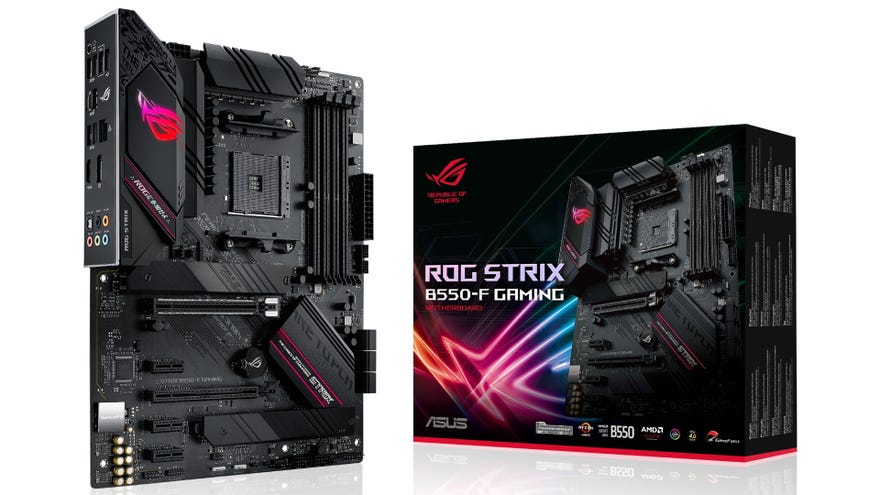AMD's B550 motherboards are finally here, bringing PCIe 4.0 to the masses
The ideal motherboard for the Ryzen 3 3300X
If you've been eyeing up AMD's excellent Ryzen 3 3300X CPUs recently, then you'll be pleased to hear that AMD's new mid-range B550 motherboards have finally arrived to buy alongside them. The long-awaited successor to AMD's popular B450 chipset, the main advantage of buying a new B550 board is that it's got built-in support for AMD's next CPU architecture, currently code-named Zen 3, giving you plenty of future-proofing for your next upgrade.
The B550 chipset also supports the super fast PCIe 4.0 standard like AMD's flagship X570 motherboards, which gives you even more future-proofing for adding PCIe 4.0 SSDs and graphics cards to your system further down the line. All of AMD's existing Radeon RX 5000 GPUs have support for PCIe 4.0, for example, including the budget-oriented RX 5500 XT, and there are more PCIe 4.0 SSDs starting to become available now, too, although the latter still cost an arm and a leg like the £270 / $230 1TB Gigabyte Aorus NVMe Gen 4 SSD.
PCIe 4.0, in case you've forgotten, gives you loads more bandwidth than the existing PCIe 3.0 standard, allowing up to 32GB/s of data flowing in each direction instead of the current 16GB/s. Provided you've got PCIe 4.0 compatible hardware plugged in, this should lead to significantly better performance across the board - although how much benefit you'll see when it comes to gaming remains to be seen at the moment, as few games demand that kind of data flow right now. Still, with AMD's hardware sitting at the heart of both next-gen consoles come the end of the year, it's only a matter of time before PCIe 4.0 starts coming into its own.
The B550 chipset also comes with support for up to two native USB 3.2 Gen 2 ports (plus six USB 3.1 ports and six USB 2.0 ports), as well as up to eight SATA ports for any existing 2.5in SSDs you've got knocking around, and overclocking support.
| Chipset | Ryzen 1000 CPUs | Ryzen 1000G APUs with Radeon graphics | Ryzen 2000 CPUs | Ryzen 2000 APUs with Radeon graphics | Ryzen 3000 CPUs | Ryzen 5000 CPUs |
|---|---|---|---|---|---|---|
| X570 | X | X | Yes | Yes | Yes | Yes |
| B550 | X | X | X | X | Yes | Yes |
| X470 | Yes | Yes | Yes | Yes | Yes | Selective Beta BIOS update needed |
| B450 | Yes | Yes | Yes | Yes | Yes | Selective Beta BIOS update needed |
| X370 | Yes | Yes | Yes | Yes | Selective Beta BIOS update needed | X |
| B350 | Yes | Yes | Yes | Yes | Selective Beta BIOS update needed | X |
| A320 | Yes | Yes | Yes | Yes | X | X |
The downside? They're only going to be compatible with 3rd Gen Ryzen processors. Sadly, that doesn't include the Ryzen 5 3400G and Ryzen 3 3200G APUs, and it doesn't look like AMD will be issuing any BIOS updates so that 1st or 2nd Gen Ryzen owners will be able to use their existing CPUs with it either.
Still, the fact that both B550 and X570 motherboards will be compatible with AMD's upcoming Zen 3 architecture (plus select X470 and B450 boards via a BIOS update) suggests that AMD will be sticking with their AM4 socket for the foreseeable future, going way beyond their 2018 promise of support until the end of 2020. However, it also suggests we'll see a similar sort of situation that Intel had with their 8th and 9th Gen Coffee Lake CPUs. These still used the same LGA 1151 socket as Intel's 6th Gen Skylake and 7th Gen Kaby Lake chips, but you had to have a 300-series chipset in order for them to work. Indeed, with the launch of their 10th Gen Comet Lake chips, Intel have now abandoned the LGA 1151 socket altogether and moved to a new LGA 1200 socket, requiring yet another new motherboard purchase for would-be upgraders.
Still, if you're thinking about buying the Ryzen 3 3300X, or indeed any of AMD's other 3rd Gen Ryzen CPUs such as the excellent Ryzen 5 3600 or Ryzen 7 3700X, then a B550 board is definitely the way to go if you don't fancy forking out for an expensive X570 board. They're available from all the usual suspects such as Asus, Gigabyte, AsRock, Biostar and MSI in all manner of form factors, although it may take a while before stock starts trickling through. Despite today's launch announcement, you'll have to wait until June 16th to actually buy one, for example, so be sure to keep your eyes peeled if you're in the market for upgrading your PC soon.

